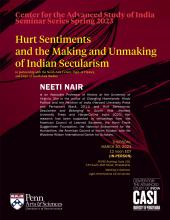
About the Seminar:
At the time of the India-Pakistan partition in 1947, it was widely expected that India would be secular, home to members of different religious traditions and communities, whereas Pakistan would be a homeland for Muslims and an Islamic state. Seventy-five years later, India is on the precipice of declaring itself a Hindu state and Pakistan has drawn ever narrower interpretations of what it means to be an Islamic republic. In this seminar, Prof. Nair will assess landmark debates over the constitutional status of religious minorities and the meanings of secularism as they have evolved to meet the demands of electoral majorities in India. She will also track cases of censorship in post-independent India that involve claims of “hurt sentiments” on the part of individuals and religious communities. Such cases, while once debated in India’s courts and parliaments, are increasingly decided on its streets in acts of vigilantism. Meanwhile, growing legal recognition and political solicitation of religious sentiments have fueled a secular resistance.
About the Speaker:Neeti Nair is an Associate Professor of History at the University of Virginia. She is the author of Changing Homelands: Hindu Politics and the Partition of India (Harvard University Press and Permanent Black, 2011) and Hurt Sentiments: Secularism and Belonging in South Asia (Harvard University Press and HarperCollins India, 2023). Her research has been supported by fellowships from the American Council of Learned Societies, the Harry Frank Guggenheim Foundation, the National Endowment for the Humanities, the American Council of Indian Studies, and the Woodrow Wilson International Center for Scholars.

